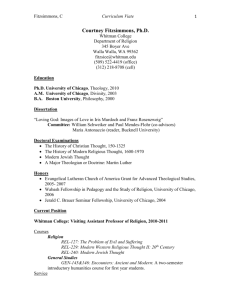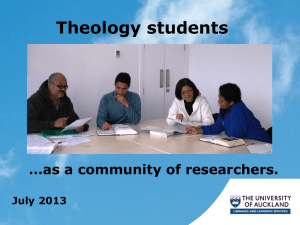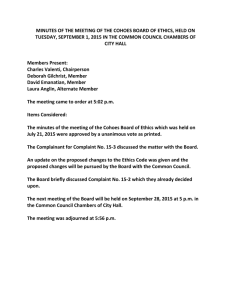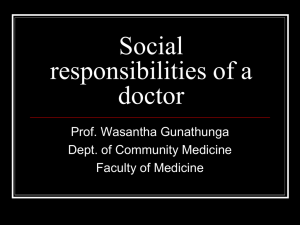Philosophy, Religion and Ethics/ Theology
advertisement
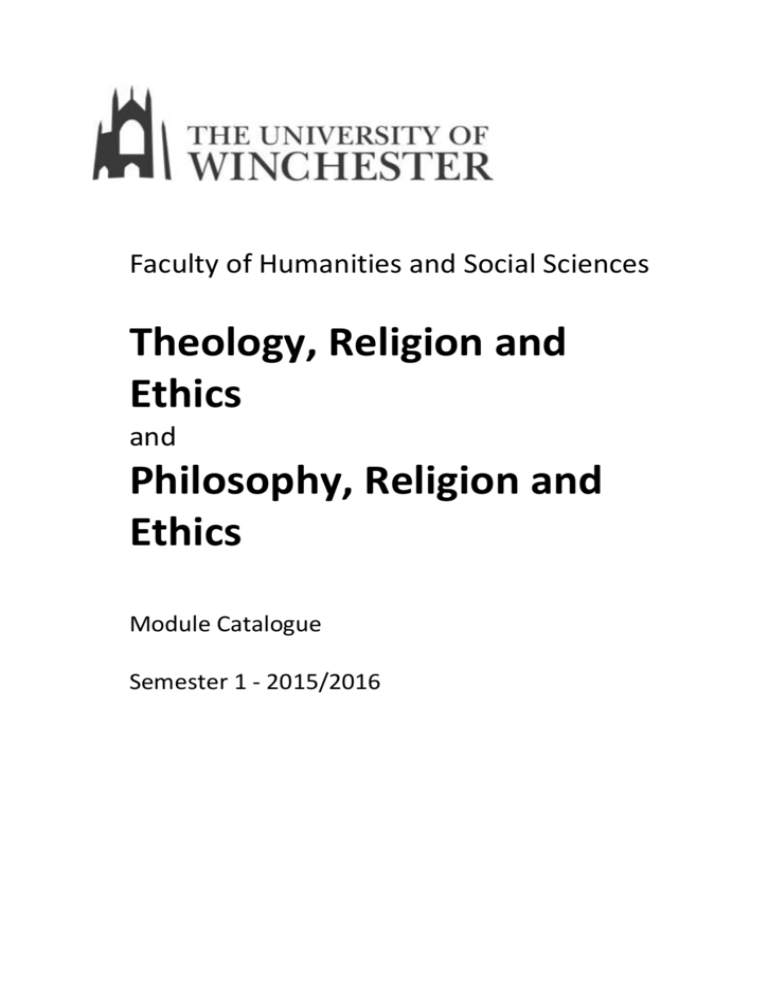
Faculty of Humanities and Social Sciences Theology, Religion and Ethics and Philosophy, Religion and Ethics Module Catalogue Semester 1 - 2015/2016 Module Code: RT1101 Module Name: Understanding Ethics and Religion Module Credits: 15 No. of Periods: 1 Level: Level 4 Module Tutor: Module Description: Ethics is concerned with fundamental and practical questions about right and wrong, about moral duty, virtue and character, and the good of human beings, communities and societies. This module explores a range of ethical theories and approaches to moral deliberation and practice. It investigates some of the ethical resources and approaches found in religious and theological traditions. It explores the interaction between ethical theory and moral practice, and engages with a range of practical ethical issues drawn from fields such as bio-medical, environmental, social and political ethics. Students will also engage with study skills in relation to the discipline of TRS and building effective academic expertise. Specific to: Philosophy, Religion and Ethics Theology, Religion and Ethics Theology, Religion and Ethics Joint Assessments: 002: 003: Formative peer reviewed essay (1000 words) Literature review (1000 words) Essay (1500 words) Availability: Occ. A Year 15/16 001: Semester S1 0% 40% 60% Day Time Module Code: RT1102 Module Name: Understanding Christianity 1: Traditions and Texture Module Credits: 15 No. of Periods: 1 Level: Level 4 Module Tutor: Module Description: The module will explore the nature of theology by focusing on the discipline of theology (i.e. reflection upon beliefs and practices from within a specific religious tradition, in this case Christianity) in relation to contemporary discourse on the study of religion and theology. Some key events in the development of Christianity will be covered in relation to their historical context, significance for the development of theological thought. Students will engage with internal Christian concepts of what theology is and how the tradition is shaped, while being asked to reflect critically upon this tradition in the light of contemporary theological thought. The nature of academic theology and the relationship of it to Religious Studies will also be discussed, with particular reference to notions of commitment and neutrality. While a focus will be placed upon the Western theological tradition, an awareness of the global nature of theology and different theological traditions will be raised, typically addressing Orthodox traditions as well as those beyond the traditional Western world, especially through the postcolonial critique of theology from Third World theologians. The way theology is shaped by its sources, and methods will be addresses, looking at questions of texts, tradition, ritual and art as expressions of theological understanding. Specific to: Philosophy, Religion and Ethics Theology, Religion and Ethics Theology, Religion and Ethics Joint Assessments: 002: Formative essay (introduction, outline, conclusion) (1500 words) Summative essay (1500 words) Availability: Occ. A Year 15/16 001: Semester S1 0% 100% Day Time Module Code: RT1104 Module Name: Understanding Religions 1: Introducing the Traditions Module Credits: 15 No. of Periods: 1 Level: Level 4 Module Tutor: Module Description: This module introduces students to key topics and critical approaches in the study of religion as well as introducing some major religious traditions. It uses criteria developed within the traditions of sociology, psychology, anthropology and the history of religions to explain belief and practice systems and their development and interactions. In this module, students will gain an understanding of some key issues in the history, thought and practice of religion in the context of at least four religious traditions. The module will introduce students not only to at least four of the world’s major religious traditions, but also to the various contexts in which they operate and the issues that challenge them, thus providing a cross-cultural and inter-religious examination of some of the key issues for the study of religion in the contemporary world. The religions covered in this module and in part 2 will ensure students have a good grounding in some of the so-called major world religions. Specific to: History, Civilisations and Beliefs Theology, Religion and Ethics Theology, Religion and Ethics Joint Assessments: 001: 002: Formative essay (1500 words) Summative essay (1500 words) Availability: Occ. A Year 15/16 Semester S1 0% 100% Day Time Module Code: RT1106 Module Name: Spirituality and Reason in the West Module Credits: 15 No. of Periods: 1 Level: Level 4 Module Tutor: Module Description: This module will trace the development of spirituality in the West in the context of developments in intellectual history, exploring key eras such as the classical ancient world, the European Renaissance, the Enlightenment, and the 19th century, before engaging in an analysis of contemporary Western spirituality. It will examine various definitions of spirituality, the relationship between spirituality and religion, and consider the claim that the West has moved towards replacing religion with spirituality. Specific to: Philosophy, Religion and Ethics Theology, Religion and Ethics Theology, Religion and Ethics Joint Assessments: 001: 002: Research project (1500 words) Essay (2000 words) Availability: Occ. A Year 15/16 Semester S1 50% 50% Day Time Module Code: RT2100A Module Name: Religions, Spiritualties and Ethics in the UK today Module Credits: 15 No. of Periods: 1 Level: Level 5 Module Tutor: Module Description: This module examines the changing role of religion in contemporary Britain by analysing the history and development of the major religious groups that are now part of British pluralist culture - Christians, Jews, Muslims, Hindus, Sikhs, Buddhists, Pagans, New Agers – as well as humanists and atheists. Secondly it explores some of the issues and challenges that have accompanied the emergence of religious diversity and the encounter with modernisation, including the experience of diaspora. It focuses upon questions of religious decline and revival and the turn to individual experience and analyses changing attitudes to amongst other things, political action, personal and especially sexual morality, education, the media and popular culture. Specific to: History, Civilisations and Beliefs Philosophy, Religion and Ethics Theology, Religion and Ethics Theology, Religion and Ethics Joint Assessments: 002: Timed essay/open exam (2000 words) Dossier (2500 words) Availability: Occ. A Year 15/16 001: Semester S1 50% 50% Day Time Module Code: RT2105 Module Name: Religion, Nature and Sustainability Module Credits: 15 No. of Periods: 1 Level: Level 5 Module Tutor: Module Description: The relationship between religions, their theologies and the natural world has been problematic. For example, the most immediately accessible part of nature, the human body, has been distinguished sharply from ‘soul’ and ‘spirit’ in the monotheistic religions. Similarly, the Earth is distinguished from Heaven and Hell, and ‘earthiness’, the mundane and the physical are often seen as opposed to spirituality and sacrality or ‘the sacred’. Conversely, some religions honour certain rocks, trees or animals as more alive, more sacred or more powerful than humanity. This module explores these varying perceptions. It also focuses attention on the ‘Greening’ of all religions in recent decades. Creation Spirituality, EcoKosher, EcoBuddhism, Paganism, and a new prominence of indigenous and shamanic religions are all significant and will be explored in discrete sessions and/or in dialogue with one another. Specific to: Philosophy, Religion and Ethics Theology, Religion and Ethics Theology, Religion and Ethics Joint Assessments: 001: Project with annotated bibliography Availability: Occ. A Year 15/16 Semester S1 100% Day Time Module Code: RT2120 Module Name: Buddhism in Global Contexts Module Credits: 15 No. of Periods: 1 Level: Level 5 Module Tutor: Module Description: The module will begin with an examination of the life of the Buddha in his historical context, it will also explore and examine the main Buddhist teachings common to most Buddhist schools in their scriptural contexts. An overview and understanding of the main divisions within Buddhism will be given with an awareness of the spread of these traditions. Emphasis will be placed on exploring Buddhist schools that developed in new contexts, such as the Pure Land and Zen traditions, as well as understanding how modernity and contact with the West has both shaped the study of Buddhism and the form of Buddhist movements. Buddhism in its Western manifestations will be explored. The use of art and other nonwritten media will be used to understand and interpret Buddhism, while attention will also be given to key scriptural passages and texts. Where possible visits from practicing Buddhists and visits to Buddhist communities will be integrated into the course. Specific to: Philosophy, Religion and Ethics Theology, Religion and Ethics Theology, Religion and Ethics Joint Assessments: 001: 002: Essay (2000 words) Website (2000 word equivalent) Availability: Occ. A Year 15/16 Semester S1 50% 50% Day Time Module Code: RT2121 Module Name: Contemporary Christian Theology Module Credits: 15 No. of Periods: 1 Level: Level 5 Module Tutor: Module Description: This module will explore the main currents of late twentieth-century and early twenty-first century Christian theology through analysis of prominent theologians and theological movements. It is possible to analyse the development of recent theology in a number of ways some scholars, for example, characterise it as a movement which has swung between the two poles of transcendence and immanence, others chart four turns to the self, Other, others and text. The first half of the module will focus on the triumph of Christian liberalism in the west and in the second half of the module will focus on intellectual disenchantment with liberalism and experience-based theologies and the emergence of post-modern theologies. Specific to: Philosophy, Religion and Ethics Theology, Religion and Ethics Theology, Religion and Ethics Joint Assessments: 001: 002: 003: Abstract (500 words) Literature review (1000 words) Essay (3000 words) Availability: Occ. A Year 15/16 Semester S1 10% 20% 70% Day Time Module Code: RT2124 Module Name: Philosophy and Religion in Global Perspectives Module Credits: 15 No. of Periods: 1 Level: Level 5 Module Tutor: Module Description: This module explores a variety of approaches to the issue of philosophy and its relationship to religion, including contemporary critiques of philosophy, especially in its Western analytic tradition. The focus will be on contemporary philosophers, philosophies and debates, although historical studies of selected non-Western philosophies may form part of the analysis of alternative approaches. Typically, sessions will consists of a close analysis of a particular philosopher or philosophical school and selected texts. The module will also seek to build student’s skills in philosophical reasoning and analysis. Specific to: Assessments: 001: 002: Availability: Occ. A Philosophy, Religion and Ethics Timed assignment (2000 words) Website with presentation (2000 words) Year 15/16 Semester S1 50% 50% Day Time Module Code: RT2128 Module Name: Atheism and its Critics Module Credits: No. of Periods: Level: Module Tutor: 15 1 Level 5 Timothy Secret Module Description: This module will track the chronological unfolding of atheist thought from ancient atomism to the contemporary new atheist movement. We will investigate both the independent quality of arguments against the existence of a deity, whether they are found in philosophical, scientific, literary or political works, and how religious thinkers have responded to those arguments, paying particular attention to how these debates have transformed religion, religions, society and our self-understanding. Particular attention will be devoted to Spinoza and his works contribution to the French Revolution and the Pantheism controversy at the heart of romanticism. We will also look at the role of atheism in the works of the three “masters of suspicion” – Nietzsche, Marx and Freud – and whether the quality of their arguments is maintained by the new atheists. Specific to: Philosophy, Religion and Ethics Assessments: 001: 002: Timed essay (1500 words) Essay (3000 words) Availability: Occ. A Year 15/16 Semester S1 30% 70% Day Time Module Code: RT3008 Module Name: Indigenous Religions Module Credits: 15 No. of Periods: 1 Level: Level 6 Module Tutor: Module Description: The living religions of the indigenous peoples of the world are often ignored in the study of religion. Sometimes they are left to anthropologists to study. Although this module assumes little or no prior knowledge of indigenous religions it will build rapidly on an introductory overview to develop critical consideration of the place of indigenous religions within both societies or cultures and individual experience. Rooted in approaches to lifeways and worldviews, it allows discussion of themes to arise from a focus on particular people's understandings, experiences and expressions. Such themes might include the world of other-than-human people, deities and spirit(s), kinship and ancestors, magic and witchcraft, religious specialists and ceremonies, mana and tabu. As the module focuses on living traditions rather than their history (or the history of destroyed communities) it will be interested in the ways in which indigenous peoples adapt and respond to the changed situation of the contemporary world. Particular attention will be paid to the importance of place(s) and land(s). Specific to: Theology, Religion and Ethics Theology, Religion and Ethics Joint Assessments: 001: Project with annotated bibliography Availability: Occ. A Year 15/16 Semester S1 100% Day Time Module Code: RT3114 Module Name: Theology and Bioethics Module Credits: No. of Periods: Level: Module Tutor: 15 1 Level 6 Neil Messer Module Description: Some of the most perplexing ethical issues in contemporary Western societies are raised by the biosciences, biotechnology and health care. Human genetics, embryo research, abortion, clinical research, health care resource allocation, the professional-patient relationship, end-of-life care and animal and plant biotechnology all raise complex ethical issues for individuals, communities, societies and policymakers. This module investigates some of these issues in depth and explores the ways in which they might be addressed by Christian theological traditions. Throughout the module there will be a focus on the fundamental theological and ethical issues underlying particular practical problems, and the relationship between theological approaches and public ethical and policy debates will be kept in view. Specific to: Theology, Religion and Ethics Theology, Religion and Ethics Joint Assessments: 001: Website Availability: Occ. A Year 15/16 100% Semester S1 Day Time Module Code: RT3116 Module Name: Religion and Culture Module Credits: No. of Periods: Level: Module Tutor: 15 1 Level 6 Chris Meredith Module Description: Many of the contemporary world’s religions increasingly offer worship not just in a physical space but in cyberspace. The internet offers the seeker a form of religious experience and self-expression which does not require a building or a minister, though it does provide a congregation, albeit of a new and very different kind. At the same time the internet abounds with misinformation and bigotry about (and also from) religions. This module explores how world religions are responding to both the opportunities and the challenges of the virtual world. Students will also explore the use of film as a means of studying religions, whilst reflecting on these representations theologically. A variety of different film genres will be used to enable analysis of the use of religion and religious themes in film, whilst also exploring and applying the different methodologies developed in the discipline of theology and film. In addition this module will allow for an exploration of a range of visual representations of religion in contemporary and historical popular culture outside film and cyber-space; television, newspapers, photography and art all give us ways of exploring representations of religions through the medium of culture, and allow us to culturally contextualise popular cultural representations of religions. Specific to: Theology, Religion and Ethics Theology, Religion and Ethics Joint Assessments: 001: 002: Dossier/project 2000 words Essay 2500 words Availability: Occ. A Year 15/16 Semester S1 40% 60% Day Time Module Code: RT3117 Module Name: Theology and Scripture Module Credits: No. of Periods: Level: Module Tutor: 15 1 Level 6 Neil Messer Module Description: This advanced module grounds students in one specific area that has been the subject of much interest in contemporary theology: the relationship between theology and the Bible, or the theological interpretation of Scripture. Through close reading of relevant texts students will be guided through this field, allowing them both to see the contours of the debate and to articulate their own position. As an advanced module the approach is interdisciplinary, bringing together topics looked at in previous Levels of the programme including history, doctrine, ethics, politics, public life, and the University. Wherever appropriate there will be an attention shown to relevant biblical texts themselves. Topics covered could include doctrines of Scripture, models of theological interpretation in the early church, Scripture and ethics, Scripture and doctrine, the place of the Old Testament in Christian theology, the church and Scripture, and the role of the Bible in a context of religious diversity. Specific to: Theology, Religion and Ethics Theology, Religion and Ethics Joint Assessments: 001: 002: 003: 004: Presentation Short essay (1000 words) Formative assessment Essay (2500 words) Availability: Occ. A Year 15/16 Semester S1 20% 20% 0% 60% Day Time Module Code: RT3125 Module Name: Buddhism in Global Contexts Module Credits: No. of Periods: Level: Module Tutor: 15 1 Level 6 Paul Hedges Module Description: The module will begin with an examination of the life of the Buddha in his historical context, it will also explore and examine the main Buddhist teachings common to most Buddhist schools in their scriptural contexts. An overview and understanding of the main divisions within Buddhism will be given with an awareness of the spread of these traditions. Emphasis will be placed on exploring Buddhist schools that developed in new contexts, such as the Pure Land and Zen traditions, as well as understanding how modernity and contact with the West has both shaped the study of Buddhism and the form of Buddhist movements. Buddhism in its Western manifestations will be explored. The use of art and other nonwritten media will be used to understand and interpret Buddhism, while attention will also be given to key scriptural passages and texts. Where possible visits from practicing Buddhists and visits to Buddhist communities will be integrated into the course. Specific to: Assessments: 001: 002: 003: Availability: Occ. A Theology, Religion and Ethics Theology, Religion and Ethics Joint Essay (2000 words) Website (2000 words equivalent) Presentation with PowerPoint (15 mins) Year 15/16 Semester S1 40% 40% 20% Day Time


